You might never have heard of Musa Keita I of the Mali Empire but it is fair to say that no-one alive today will ever make such an impact on the world today.
Born in 1280 AD, Musa grew up in the extremely wealthy Malian Empire of western Africa which occupies the lands roughly around and about present-day Mali and the southern sections of Mauritania. For some in the west it is easy to think of power and rich empires of being solely the preserve of, well almost anyway but Africa but that is simply not true. Africa had its glorious empires like everywhere else, some munificent, some murderous and some fabulous, just as with other empires around the world.
Few though could rival the wealth of Mali in this time and Musa himself is reputed to have added 24 new territories through conquest during his reign with a list of honorary titles almost as long as his conquests including Emir of Melle, Lord of the Mines of Wangara, Conqueror of Ghanata and Lion of Mali.
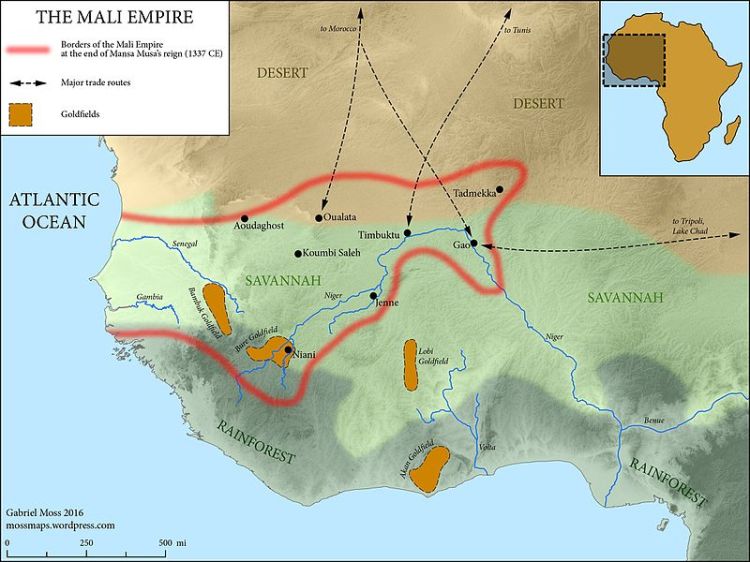
As with many African Empires of this time however, little-written evidence remains of it, at least as written by the scholars of Mali themselves. Instead as in so many other cases our history of the empire comes from Arab scholars such as Ibn Khaldun and Ibn Battuta who would sometimes use both a mix of oral history and first hand accounts. One such Egyptian scholar by the name of Al-Umari notes of how Musa came to power due to the Malian tradition of the future king being nominated by to take command if the current monarch goes awol, usually on a pilgrimage to Mecca. In this case though it was quite different.
“The ruler who preceded me did not believe that it was impossible to reach the extremity of the ocean that encircles the earth (the Atlantic Ocean). He wanted to reach that (end) and was determined to pursue his plan. So he equipped two hundred boats full of men, and many others full of gold, water and provisions sufficient for several years. He ordered the captain not to return until they had reached the other end of the ocean, or until he had exhausted the provisions and water. So they set out on their journey. They were absent for a long period, and, at last just one boat returned. When questioned the captain replied: ‘O Prince, we navigated for a long period, until we saw in the midst of the ocean a great river which was flowing massively.. My boat was the last one; others were ahead of me, and they were drowned in the great whirlpool and never came out again. I sailed back to escape this current.’ But the Sultan would not believe him. He ordered two thousand boats to be equipped for him and his men, and one thousand more for water and provisions. Then he conferred the regency on me for the term of his absence, and departed with his men, never to return nor to give a sign of life.”
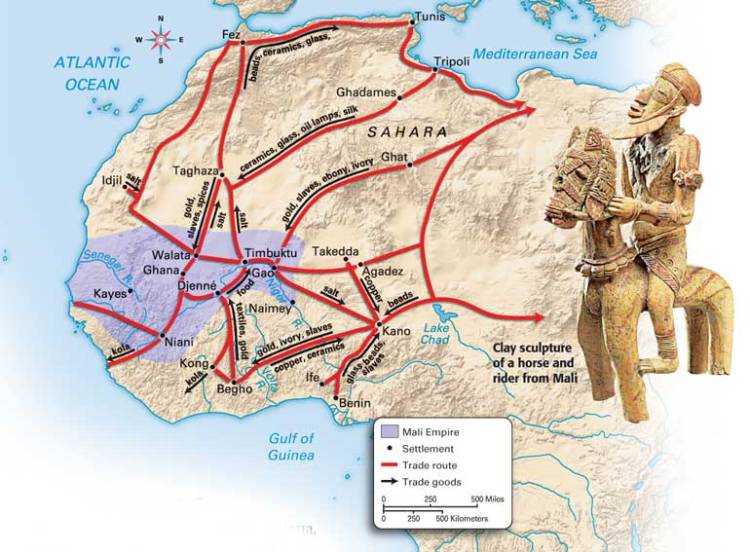
This account also gives an insight into the ambition and might of the Malian Empire, how many nations in the world in the 13th century would even think of sailing around the world?
There are several tales of incredibly rich cities of gold or similar wealthy oasis around Africa, Asia and South America but with Mali the truth was much more impressive than any fiction. The gold in Mali came from three massive gold mines at Bambuk, Boure, and Galam that were added to the Empire’s lands in the early days of conquering. With these three mines, it’s estimated that Mali provided half of the gold for the entirety of Africa, Europe, and Asia by the 14th century. With these riches, Mali became the greatest empire in African history and, in fact, only the Mongol Empire was larger in the world in the time of Mansa Musa I. In fact for around 400 years the empire of Mali is arguably one of the most powerful empire the world has seen.
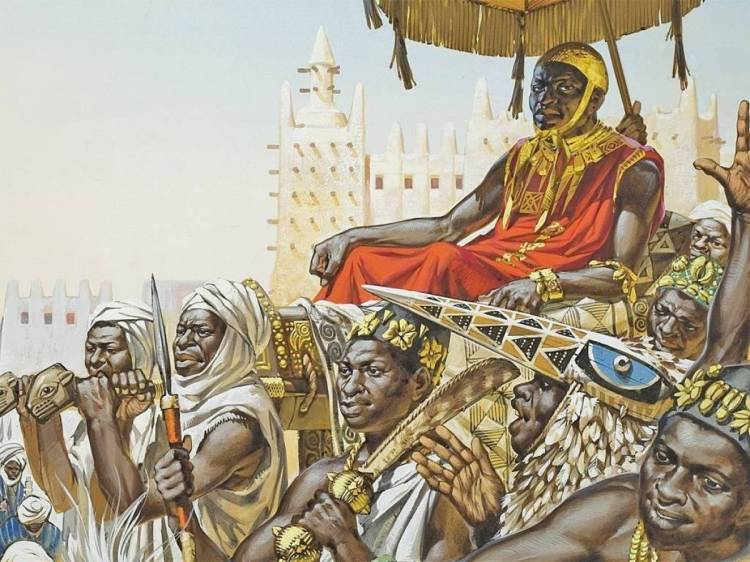
Mansa Musa was a devout follower of Islam and as such it was his duty to make the Hajj pilgrimage at least once during his lifetime. Being the richest man on the planet however, he did so in his own amazing fashion. It is said that his entourage consisted of an estimated personal guard of 500 men with him, plus over 100 gold-laden elephants, and a few hundred camels to carry all of the supplies for the journey. Some estimate that the number of slaves in the entourage was around 12,000, and that the total number of people was 60,000 and the trip took over 2 years to complete. Maybe that was because he took with him $600 million in gold too.
Whether it was for pious reasons related to his Hajj or whether he wanted to demonstrate his immense wealth and power, there is little hiding the fact that Musa was extremely generous to all that he met on his Hajj.
“At each halt he would regale us [his entourage] with rare foods and confectionery.” Khaldun also claimed that Musa brought with him “80 loads of gold dust, each load weighing three qintars,” which in total would be 26,455 pounds of gold for the trip.
In fact, his kindness actually caused huge ramifications for Africa, the Middle-East and many other places. Historian al-Maqrizi wrote “the members of his entourage proceeded to buy Turkish and Ethiopian slave girls, singing girls and garments, so that the rate of the gold dinar fell by six dirhams.” This was just in once city but his Hajj actually destroyed the value of gold for over 12 years. His supreme wealth and generosity actually made the value of gold almost worthless. It’s almost impossible to imagine anything that could equal this today. Just imagine if someone was so rich and gave out enough free money that the value of money became meaningless.
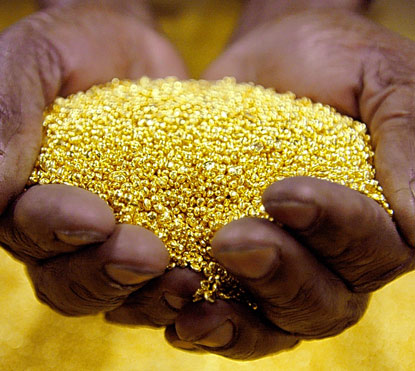
Though the point is argued, it is believed by some that on realising what he had done, Musa returned to Mali and revisited as many of the cities as he could and bought back the gold at a high rate of interest. Whether this is true or not, Musa did do some other incredible things such as creating the fabulous libraries and Madrassas at Timbuktu which housed over 1 million documents and over 25,000 students a year to study them… yes that is why that city has such a famous reputation. In fact many teachers and scholars were recruited from the epic Hajj to Mecca as Musa realised gold could only get you so far and that learning and education would be what would make his people truly rich.
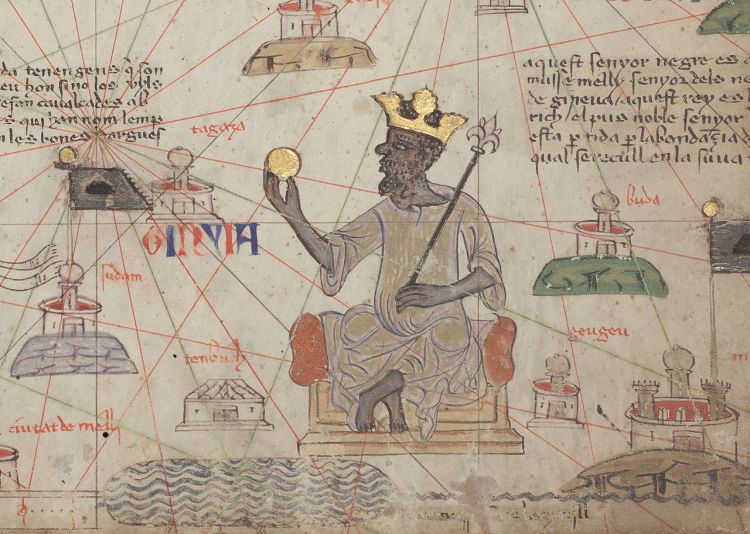
Fascinating piece….good post….chuq
LikeLike
Though unconnected, you come up with interesting posts of many different kinds. Enjoyable.
LikeLiked by 1 person
Thank you 🙂 I should copy the BBC’s slogan of Entertain, inform and educate!
LikeLiked by 1 person
Great story! What happened to the last sentence?
LikeLiked by 1 person
I’m glad you liked it. Thanks for finding that for me. For some reason WordPress crashed 4 times whilst writing this blog. At one point I had completed that last sentence only for it to crash and when it re-opened I made other changes but that final section had been lost but I hadn’t noticed. Thanks again 🙂
LikeLike
It’s inconceivable that a man was this rich and so generous. He would be a wonderful example for out world today.
LikeLiked by 1 person
I agree. Apparently the only people close are The Rothchilds family who have $350 Billion. They do a little bit of charity but really it is nothing. Amazing to think they could give everyone in the UK and USA $1 million. That would certainly change things in a similar way to King Musa.
LikeLike
Being Ghanaian I had heard of Mansa Musa but I didn’t know that he was richer than Croesus. The name Ghana comes from the ancient Ghana empire after which rose the ancient Mali Empire. I don’t know how historically accurate it is but some people have speculated the Akans of modern day Ghana share some ancestry with ancient Mali. I am an Akan myself and when I look at the artists depiction of Mansa Musa it looks very similar to our own chieftaincy customs. Check out the following link to an image to see what I mean http://twiteacher.com/wp-content/uploads/2012/01/Ashanti.jpg
LikeLike
Thank you Stephen for this fascinating insight into Musa I of Mali and thankyou also Kwadwobeng for giving me access to further reading and info.
LikeLiked by 1 person